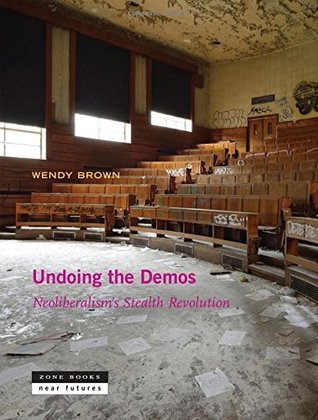What do you think?
Rate this book


296 pages, Paperback
First published February 6, 2015
Wendy Brown acknowledges at the start of this work of political theory that no one uses the term "neoliberalism" who is not an opponent or critic of neoliberalism. I'm sure you've noticed this, that in popular usage, neoliberal is a term for anything the speaker doesn't like. In the past I would have said that neoliberal policies are identical with crony capitalism, or corruption. Brown makes the case that neoliberal reason has taken over from our society's previous liberal democratic assumptions. She uses the term reason rather than ideology I think to emphasize how pervasive the ideas of neoliberalism have become.
Brown's focus is on how we view government and the sovereignty of the individual. Starting with Michel Foucault's late 1970s-early 1980s Biopower lectures (no no, it's really not all about Foucault! She's very clear! I was able to understand even the two chapters of discussion of Foucault's ideas, because Brown is systematic.) Brown develops a definition of neoliberal reason with examples that made a lot of sense to me. In classical liberal thinking, the free market is naturally competitive, and the position of political parties on the task of government were variously to keep hands off or to regulate the market. In neoliberal thinking, the sole task of government is to facilitate competition in the economy, which might otherwise grind to a halt. Neoliberalism posits that a healthy economy is the sole responsibility of government, taking the place of any public goods (or even concepts of public good.)
We have taken on board some of the ideas that Brown considers neoliberal reason more than others. Her most radical notion is that human individuals have come to see ourselves as human capital. It is this idea that I think we've all swallowed, more than any other. Other ideas I think we have not. For example, when Brown discusses the 2010 Supreme Court decision Citizens United in chapter five, she offers an interesting reading of the ideological underpinnings of a legal decision that already didn't make any sense to me. The reading was perhaps radical, but the idea that the decision was corrupt was intuitive. It's where she talks about non-profit organizations that want to be like businesses, and individuals who want to develop their human capital potential, and educational institutions that are all about human capital that I had my head-clutching, "aha!" moments.
The truth is, it's not only our villainous political opponents (whoever those are for you) who believe in neoliberal reason. In our desperation in a financialized economy that can function as well on our debt as on our labor, we've all taken on the project of developing ourselves and our children as human capital. We've all taken on the idea that our government's key responsibility is creating an economy where we can work rather than be farmed as debtors. Every public good is subordinate to our desire to make a living through our work. Gradually, but not all at once, we begin to see the reasons that we work for a living--families, books, music, leisure, sports, food, health--as reasons we should get to work, get hired, be part of the economy.
The end of the book is the part that surprised me. Brown is not a classical liberal. She doesn't believe that democracy as it was, was perfect. She recognizes the role of racism and sexism and other forms of bias to justify excluding individuals from the demos. At the end of the book, she makes a passionate case for the value of individual sovereignty and the promise of democracy. It's there I think readers of many political positions can have a meeting of the minds.